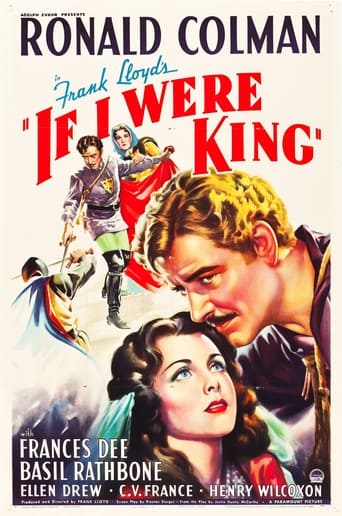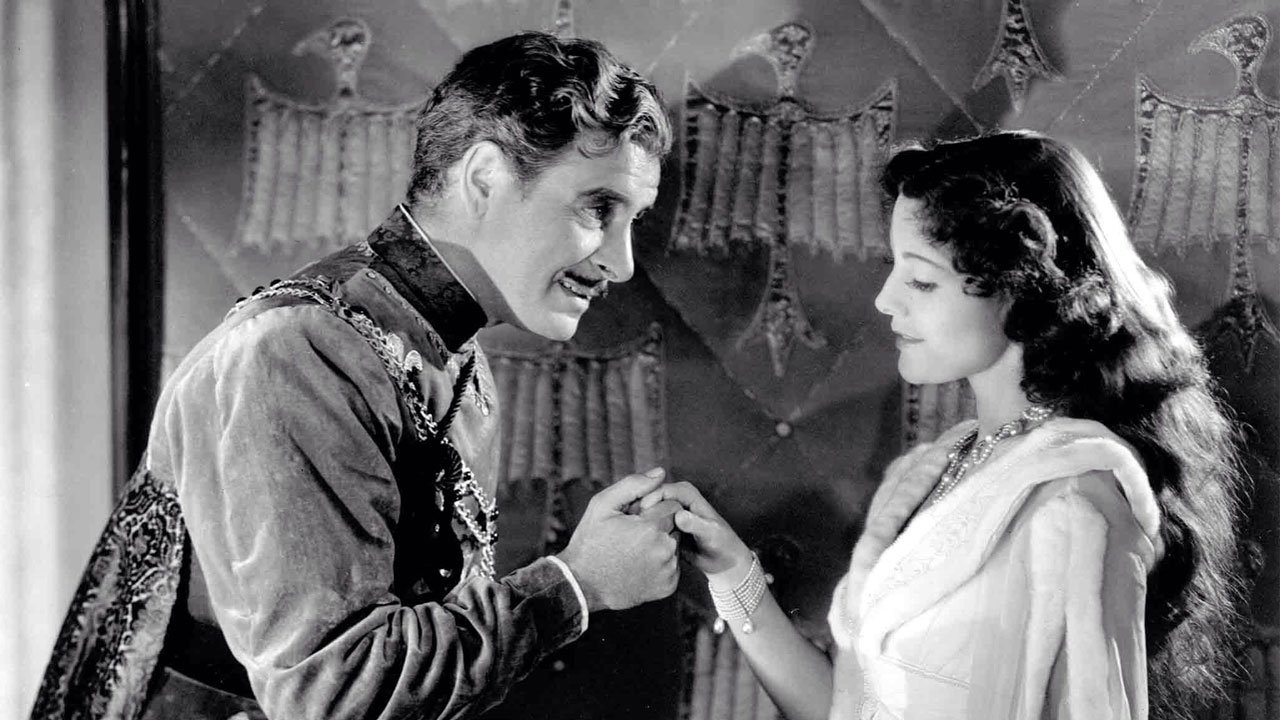weezeralfalfa
This classic romantic story of a divided 15th century France is based upon the 1901 romantic novel and play of the same name. There were 2 musical film versions, as well, in 1930 and 1956, entitled "The Vagabond King". I've seen the '56 version, which was filmed in Technicolor and is 15min. shorter, plus allowance for the musical numbers further reduces the time available for the story. Preston Sturges wrote the present version, and Frank Lloyd directed it. The plot concerns the conflict between the king of France: Louis XI(Basil Rathbone), and Duke Charles of the large, nearly independent, province of Burgundy. An army from the Burgundians has laid siege to Paris for some time, and is waiting for the mass of people to get so hungry that they depose Louis, and surrender to the Burgundians. Thus, the commoners of Paris are prepared to support the Burgundians should they succeed in entering the city. That is, until poet, thief, and murderer, Francois Villon convinces them that if they instead support Louis' troops when the Burgundians enter the city, they can defeat the Burgundians, they will again be able to trade with the outside world. This is, in fact, what ensues, after Villon, as the Lord Constable, opens the royal food stores for the rabble to pillage. While we are waiting for this to happen, attention is focused on the opposing adversarial and cooperative relationships between Villon and Louis. Villon has displeased Louis by claiming(in the unknown presence of Louise) that he, himself, could do a lot better job of governance. Also, he led a raid on some crown food stores. However, Villon did expose and kill the traitor: the then Lord Constable; the second most powerful official in Paris. On the one hand, Louis wants to hang Villon. On the other hand, he wants to make him the new Lord Constable, so that he can come to appreciate the difficulties of ruling. Thus, Louis decides to make him the Constable until the Burgundian menace is decided, then hang him. However, after Villon's plan against the Burgundians works, Louise softens a bit and changes his sentence to permanent banishment from Paris. As a sideshow, Villon develops a romantic relationship with Lady Katherine(Frances Dee), she not suspecting that he is of underclass origins. Villon also has a thing going with tavern wench Huguette(Ellen Drew). These 2 women represent the polar extremes of Villon's character, as a courtly poet and temporary high official, or as a common thief, fraternizing with other riffraff. He quotes a Villon poem to Lady Katherine, beginning with "If I were king"A major believability problem with the above scenario is that Villon's only evident means of hiding his true identity as the Lord Constable is growing a moustache. Thus, those who know him as Villon should easily recognize him as Lord Constable!In one of the more bizarre scenes, as the Lord Constable, Villon tries his associates involved in the royal food stuffs robbery. Instead of sentencing them to some draconian punishment, he gives each a number of gold coins taken from the previous subject on trial!Coleman is OK as Villon, but I think the much younger Errol Flynn would have been more dynamic. Unfortunately, he was contracted to the wrong studio, and probably was playing Robin Hood for Warner at this time. The similarities between Villon and Robin Hood are evident, despite one being a city dweller and the other a forest dweller.So, which do I prefer: this version or the '56 version? Probably, the '56 version, with its music and Technicolor. However, the 2 are sufficiently different in their details that a viewing of both might be warranted if you like the basic story. See it on YouTube.
edwagreen
Ronald Colman and Basil Rathbone both starred in the memorable "Tale of 2 Cities," an outstanding film dealing with revolutionary France. 3 years later they appeared in this 1938 production and with his sort of meek way of speaking, a memorable walk but the hidden viciousness of the usual sinister Rathbone, it garnered him a supporting Oscar nomination.This film does not compare with the 'Cities' class of 1935. The writing in this film is not as good and with treachery abounding here, we should have seen more of a devilish attitude by all concerned here.Even the priest is subdued here in a part that could have shown a lot more relevance.
robertguttman
"If I Were King" has a lot going for it. Based upon a 1901 play by Justin Huntly McCarthy that was subsequently transformed into a successful operetta by Rudolph Friml, the screenplay for this version was written by Preston Sturges. That means it includes a significant amount of Sturges' unique brand of sophisticated and sly wit. This was early in Sturges' career, before he emerged as a successful combination writer and director. Sturges' later films included such classics as "The Great McGinty", "Sullivan's Travels", "The Lady Eve", "The Palm Beach Story", "The Miracle of Morgan's Creek" and "Unfaithfully Yours". "If I Were King" also included superior performances by two great actors at the top of their game. Ronald Coleman was the perfect choice to play the swashbuckling poet-rogue, Francois Villon. For the benefit of those not familiar with French literature, Francois Villon really was a 15th Century French poet, he really did graduate from the Sorbonne and he really was a petty criminal who seems to have been constantly in trouble with the law. Born in Paris in 1431, Villon is described as having "disappeared from view" in 1463. To this day nobody really knows for sure what became of him, although the presumption is that he came to no good end. However, there is absolutely no evidence that he ever did anything even remotely heroic. Ronald Coleman possessed more than enough swashbuckling charm to carry the role, as well as the mellifluous voice to make the poetry work as few other actors, even in his day, could have done. Usually known for playing either villains or Sherlock Holmes, Basil Rathbone, was given a rare opportunity to demonstrate his acting virtuosity by playing an aging King Louis IX; the clever, conniving and cynical French monarch who has become known to history as "Louis the Spider". At one point in the movie Preston Sturges has the King self-deprecatingly remark that, "The people of France already have one 'Saint Louis', another would only confuse them".
Arthur Hausner
I knew I was in for a treat when I saw Preston Sturges was scriptwriter for this film, which was clever and energetic, but I didn't expect such wonderful performances from both Basil Rathbone (who received an Oscar nomination) and Ronald Colman. I always felt Colman didn't pick up his lines fast enough (at least in his later years), but he's perfect playing the poet François Villon. Colman sounds like a poet whenever he speaks in all his roles! You've never seen Rathbone in any role quite like that of Louis XI. He sounds at first almost childlike, but it is a mask - he's pretty wily and knows what he is doing all the time. The script, of course, is pure hokum. You can't imagine for one moment that a king would make Grand Constable a man who was caught stealing food from the royal storehouse. As Grand Constable, he runs France! The extended scene where he, while hidden, metes out sentences to his friends who were also caught stealing, is pure delight, and very worthy of Sturges. I found fault with Villon's earlier escape, as it was too easy, and with the casting of Ellen Drew in the role of one of the wenches at the Fir Cone tavern, and who loves Villon. There was too much to enjoy in the film so those were easy to forgive. His other love is Frances Dee, playing one of the nobles at court, and she is always stunningly dressed in Edith Head's costumes. The rest of the cast was all first rate, and the Oscar-nominated sets were excellent. Curiously, the film is set in 1463, the approximate year that Villon died at the age of 32. Also, William Farnum, who plays General Barbezier in this film, played Villon in the 1920 silent of the same name as this film.


 AD
AD


